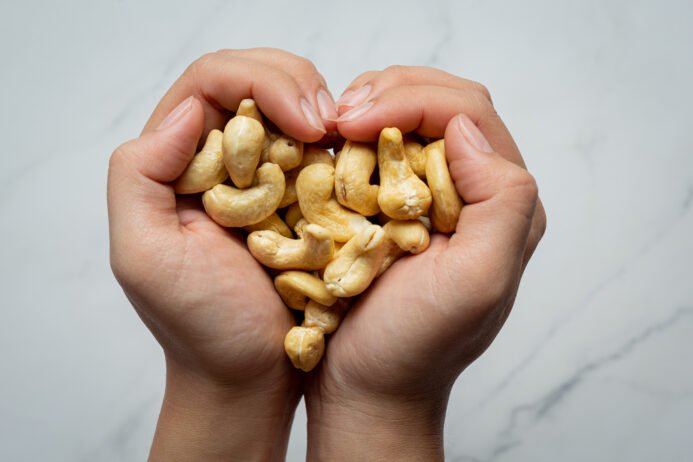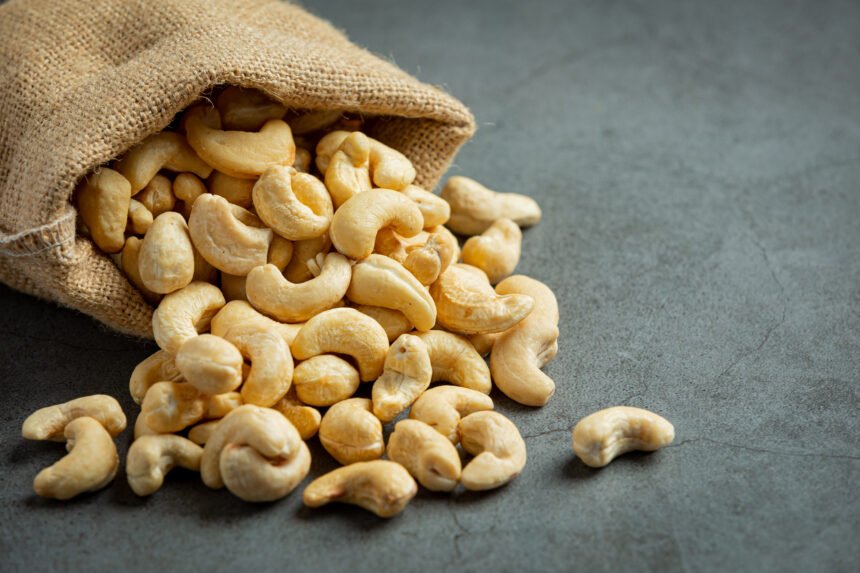Cashews' Nutritious Value
A serving of 1 ounce (28 g), or roughly 16–18 cashew nuts, offers:
- Approximately 157 calories
- 5g of protein
- 9g of carbohydrates
- 1g of fiber
- 12g of fat, largely good unsaturated fats
- 1% Daily Value (DV) of vitamin E
- Vitamin K: 8% DV
- 20% DV for magnesium
- Iron: 11% DV
- Copper: 67% DV
- Zinc: 15% DV
- 13% DV for phosphorus
Additionally, cashews are a great source of plant sterols, phytochemicals, and antioxidants.
The Health Advantages of Cashews


Lower levels of cholesterol
Due to their high saturated fat content, cashews have a negative image. However, stearic acids, which make up a large portion of cashew fat, are thought by experts to have minimal impact on blood cholesterol. According to research, consuming a modest portion of cashews daily may result in a slight decrease in LDL “bad” cholesterol.
Preventing heart disease
Cashews’ high magnesium concentration may help prevent heart disease in addition to lowering bad cholesterol. Magnesium supplementation may lower your risk of ischemic heart disease, which is caused by insufficient blood flow to the heart.
Preventing strokes
Cashews contain magnesium, which may lower the risk of stroke. Hemorrhagic strokes, which occur when a weak blood vessel bursts and blood flows into the brain, are regarded to have the strongest correlation with this.
Preventing or managing diabetes
Especially when compared to many other popular snacks, cashews are low in carbs. Because of this, they have less of an effect on blood sugar, which makes them suitable for both individuals with type 2 diabetes and those wishing to avoid the disease.
Cashew varieties
- The King of Cashews, W-180, is large and of high grade.
- Jumbo cashews, or W-210, are a little smaller but still substantial.
- W-240 (Popular Grade): widely used and reasonably priced.
- Smaller cashew grades, W-320 and W-450, are used in baking and frying.
Methods for Eating Cashews
- Savor it as a snack, raw or roasted.
- Use in Indian desserts such as payasam, kaju roll, and kaju katli.
- Stir into gravies and curries (cashew paste gives them a creamy texture).
- To replace dairy, make cashew milk or cashew butter.
- Sprinkle over smoothies, salads, and desserts.
Precautions
- Because cashews are high in calories, eating too many of them can make you gain weight.
- Cashews may cause allergies in certain persons.
- Raw or mildly roasted cashews are healthier than salted and roasted ones, which may contain too much sodium.
Concluding remarks
In addition to being a tasty snack, cashews are a nutrient-dense superfood that promotes immunity, heart health, brain function, and radiant skin. A small amount of cashews (about four to six per day) can have long-term health advantages.


